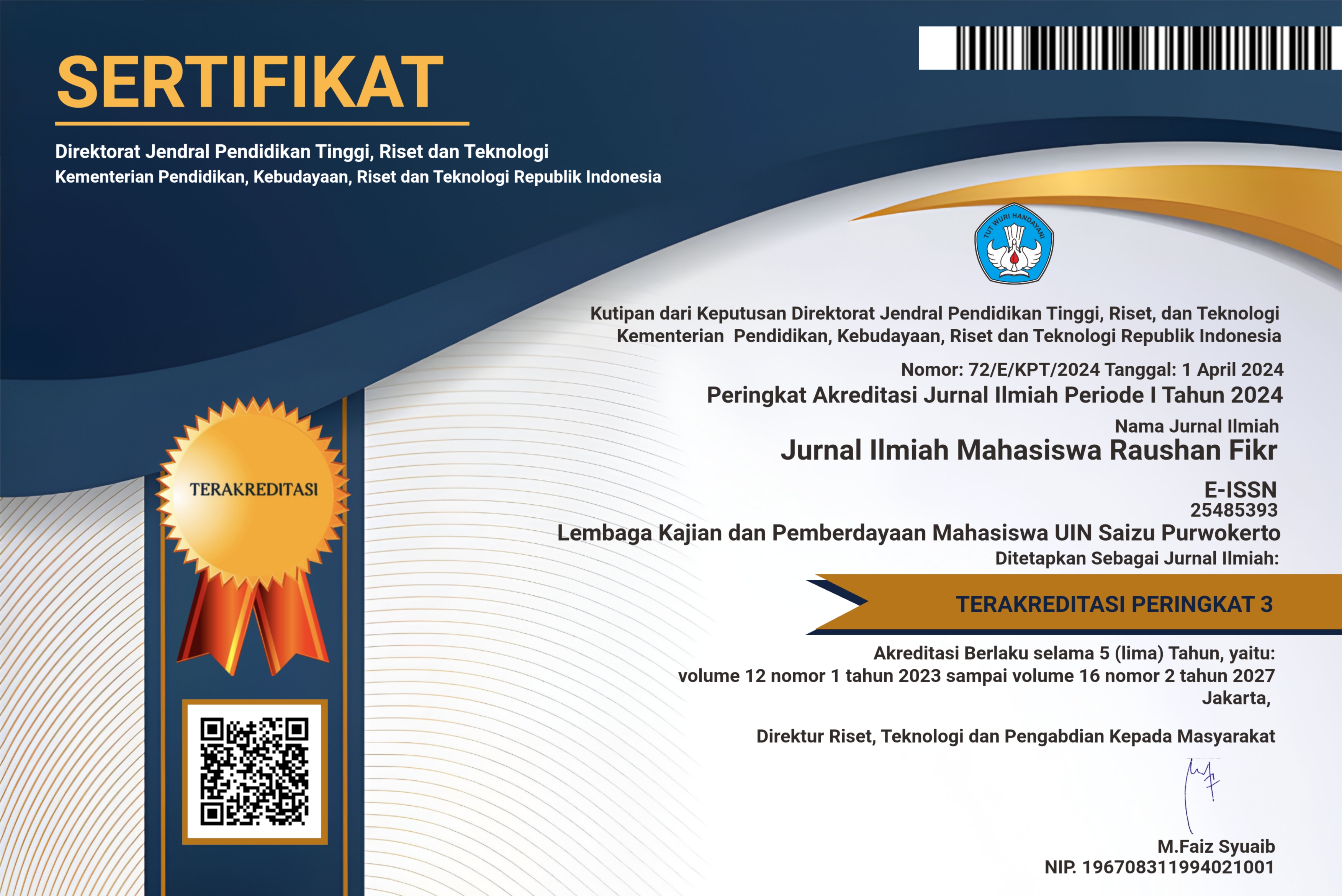STRATEGI DAN METODE PENDIDIKAN KARAKTER
DOI:
https://doi.org/10.24090/jimrf.v6i1.2748Keywords:
Character, Education, Strategy, MethodAbstract
It is appropriate that the implementation of education in the school and madrasah aims to develop all potential learners in both the cognitive, psychomotor and affective domains. Cognitive is the intelligence of thinking, is expected to follow the existing programs in educational institutions learners have the ability to think better. Psychomotor is a skill development field, it is through this education that learners are expected to have skills in a particular field. Affective is the development of the attitude of learners in a better direction. With learners are in the educational environment is certainly expected to have a superior attitude and behavior. The development of the affective sphere that the current era we often hear with the term education of character, is still very interesting to continue reviewed. In relation to finding the right strategies and methods to be implemented both at school and madrasah. Strategy and method is very important in the implementation of education. If possible, say these strategies and methods is the key to the effective implementation of education. This paper offers alternative strategies and methods that can be used in the organization of character education. With the strategies and methods offered this character education is expected in the school environment maupu madrasah can be well organized and able to print a generation of character.Downloads
References
Abdul Majid dan Dian Andayani, Pendidikan Karakter Perspektif Islam, Bandung: PT Remaja Rosdakarya, 2012
Agus Wibowo, Pendidikan Karakter (Strategi Membangun Karakter Bangsa Berperadaban), Yogyakarta: Pustaka Pelajar, 2012
Amirullah Syarbini, Buku Pintar Pendidikan Karakter Penduan Lengkap Mendidik Karakter Anak di Sekolah, Madrasah dan Rumah, Jakarta: as@-prima pustaka, 2012
Daryanto dan Suryatri Darmiatun, Implementasi Pendidikan Karakter di Sekolah, Yogyakarta: Penerbit Gava Media, 2013
Deni damayanti Panduan Implementasi Pendidikan Karakter di Sekolah (Teori dan Praktik Internalisasi Nilai, Yogyakarta: Araska, 2014
Dharma Kesuma dkk, Pendidikan Karakter Kajian Teoritik dan Praktik, Bandung: PT. Remaja Rosdakarya, 2013
Doni Koesoema A, Pendidikan Karakter Utuh dan Menyeluruh, Yogyakarta: Kanisius, 2012
Endah Sulistyowati,Implementasi Kurikulum Pendidikan Karakter, Yogyakarta: PT. Citra Aji Parama, 2012
Fatchul Mu’in, PendidikanKarakter (KonstruksiTeoretikdanPraktik), Yogyakarta: Ar-Ruzz Media, 2013
Furqon Hidayatullah, Pendidikan Karakter: Membangun Peradaban Bangsa, Surakarta: Yuma Pustaka, 2010
Haedar Nasir, Pendidikan Karakter Berbasis Agama & Budaya, Yogyakarta: Multi Presindo, 2013
Heri Gunawan, Pendidikan Karakter:Konsep dan Implementasi, Bandung: Alfabeta, 2012
Jamal Ma’murAsmani,BukuPanduanInternalisasiPendidikanKarakter di Sekolah, Yogyakarta: Diva Press, 2011
Kementerian Pendidikan Nasional, KebijakanNasional Pembangunan Karakter Bangsa 2010-2025, Jakarta: KementerianPendidikan Nasional, 2010
Masnur Muslih, Pendidikan Karakter Menjawab Tantangan Krisis Multidimensional, Jakarta: PT Bumi Aksara, 2011
Novan Ardy Wiyani, Pendidikan Karakter berberbasis Iman dan Taqwa, Yogyakarta: Teras, 2012
Syamsul Kurniawan, Pendidikan Karakter Konsepsi dan Implementasinya secara Terpadu di Lingkungan Keluarga, Sekolah, Perguruan Tinggi dan Masyarakat, Yogyakarta: Ar-Ruzz Media, 2013
Zainal Aqib, Pendidikan Karakter di Sekolah (Membangun karakter dan kepribadian anak), Yrama Widya: Bandung, 2012
Zubaedi, Desain Pendidikan Karakter Konsepsi dan Aplikasi dalam Lembaga Pendidikan, Jakarta: Kencana Prenada Media Group, 2011
Downloads
Published
How to Cite
Issue
Section
License
Authors who publish with this journal agree to the following terms:
- Authors retain copyright and grant the journal right of first publication with the work simultaneously licensed under a Creative Commons Attribution-NonCommercial-ShareAlike 4.0 International License that allows others to share the work with an acknowledgement of the work's authorship and initial publication in this journal.
- Authors are able to enter into separate, additional contractual arrangements for the non-exclusive distribution of the journal's published version of the work (e.g., post it to an institutional repository or publish it in a book), with an acknowledgement of its initial publication in this journal.
- Authors are permitted and encouraged to post their work online (e.g., in institutional repositories or on their website) prior to and during the submission process, as it can lead to productive exchanges, as well as earlier and greater citation of published work (See The Effect of Open Access).
















